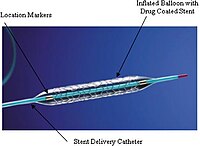
Photo from wikipedia
Rationale, aims and objectives: Medical residents are among the most important and influential members of the medical team and the level of their knowledge regarding potential drug-drug interactions (DDIs) is… Click to show full abstract
Rationale, aims and objectives: Medical residents are among the most important and influential members of the medical team and the level of their knowledge regarding potential drug-drug interactions (DDIs) is a good predictor of the ability to prevent the occurrence of DDIs, as well as safe and rational prescribing in inpatient settings. This survey was designed to evaluate internal medicine and cardiology residents' knowledge and opinion toward DDIs and to determine different sources of DDI information used by this population. Method: This cross-sectional knowledge attitude practice (KAP) questionnaire study was conducted in Shiraz, Iran. A 25-question questionnaire was designed and completed by 86 internal medicine and cardiology residents. The questions were related to the participants' demographic information, their practice characteristics, the information sources used by the participants, the residents' opinion regarding DDIs, and their knowledge regarding the interaction between 8 drug pairs. Results: The results showed that when the participants wanted to learn more about DDIs, most of them used software on mobile or tablet (59.3%). Nearly three-fourths of the participants (73.82%) reported that when a patient was about to be exposed to a potential DDI, they were informed by software on mobile or tablet that the interaction may be present. On average, residents answered 44.03% ± 23.79 of drug pair questions correctly.Conclusion: Our results show insufficient practice skills, as well as relatively poor knowledge concerning the participants' answers to questions. It seems that further practical training and education are required to enable prescribers to prevent potential DDIs.
Journal Title: Hospital topics
Year Published: 2022
Link to full text (if available)
Share on Social Media: Sign Up to like & get
recommendations!